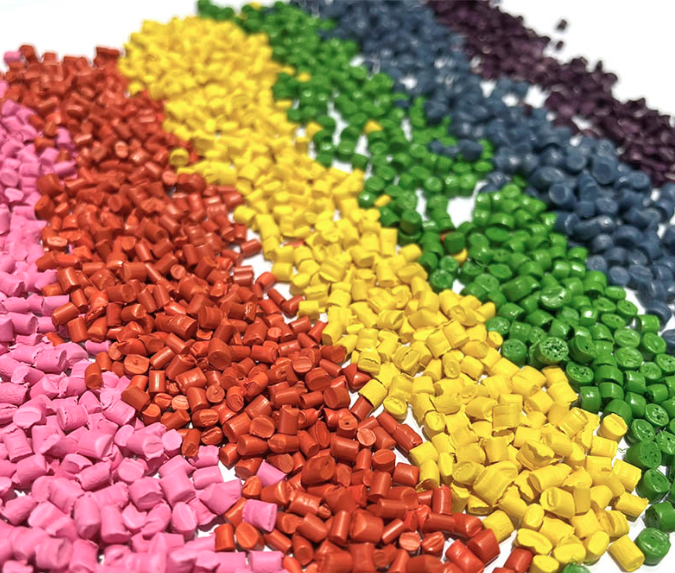Application of Calcium Carbonate in Color Masterbatch
- Postdate: 2023-06-08
- From: qibochem.com
-
Application of Calcium Carbonate in Color Masterbatch
- Postdate: 2023-06-08
- Form: qibochem.com
-
Calcium carbonate is widely used in filling polyvinyl chloride (PVC), polyethylene (PE), polypropylene (PP), acrylonitrile-butadiene-styrene copolymer (ABS), and other resins. Adding calcium carbonate has a certain effect on improving some properties of plastic products and expanding their application range. In plastic processing, they can reduce resin shrinkage, improve rheological state, and control viscosity. It can also play the following roles
1. Improve the dimensional stability of plastic
The addition of calcium carbonate plays a skeleton role in plastic products and has a great effect on the stability of the size of plastic products.
2. Improve the hardness and rigidity of plastic products
In plastics, especially soft polyvinyl chloride, the hardness gradually increases with the addition of calcium carbonate, and the elongation decreases with the increase in hardness. Calcium carbonate with fine particles and high oil absorption value has a large increase in hardness. Conversely, calcium carbonate with a small coarse oil absorption value will have a small increase in the hardness of the plastic. In soft PVC, the hardness growth rate of heavy calcium carbonate is the smallest, followed by precipitated calcium carbonate (light).
Calcium carbonate generally cannot play a reinforcing role in plastic (resin), and the particles of calcium carbonate can often be infiltrated by resin, so the normal effect of adding calcium carbonate is to increase the rigidity of the resin, and also increase the elastic modulus and hardness. Both the tensile strength and extreme elongation decreased with the increase of the addition amount.
Different calcium carbonates, different addition amounts, and hardness will also be different.
3. Improve plastic processing performance
The addition of calcium carbonate can change the rheological properties of plastics. Calcium carbonate
The powder is often added in a relatively large amount, which is helpful for its mixing with other components and also for the processing and forming of plastics.
The addition of calcium carbonate, especially after the addition of surface-treated calcium carbonate, can not only improve the hardness of the product but also improve the surface gloss and surface smoothness of the product.
The addition of calcium carbonate can reduce the shrinkage rate, linear expansion coefficient, and creep performance of plastic products, creating conditions for processing and forming.
4. Improve the heat resistance of plastic products 
Adding calcium carbonate to general plastic products can improve heat resistance. For example, adding about 40% calcium carbonate to polypropylene increases heat resistance by about 200°C. When the filling ratio is less than or equal to 20%, the heat-resistant temperature increases by 8 to 130°C.
5. Improve the astigmatism of plastics
In plastic products, some products require whitening and opacity, and some products require matting. The addition of calcium carbonate can play a certain role in this respect.
Calcium carbonate with whiteness above 90 has an obvious whitening effect on plastic products. Combined with titanium dioxide and lithopone, the matting properties of plastic products are greatly improved.
In calcium-plastic paper, in low-density polyethylene (LDPE) and high-density polyethylene (HDPE) films, adding calcium carbonate can achieve the effect of astigmatism and extinction, making it suitable for writing and printing.
Calcium carbonate with better whiteness can also replace expensive white pigments.
6. It can make the product have some special properties.
The addition of calcium carbonate to the cable material has a certain insulating effect, and the addition of calcium carbonate can improve the electroplating performance and printing performance of some products.
Fine or ultrafine calcium carbonate is added to polyvinyl chloride (PVC), which has a certain flame-retardant effect.
7. Reduce the cost of plastic products
The price of ordinary light calcium carbonate and heavy calcium carbonate is far lower than the price of plastic, and the addition of calcium carbonate will reduce the cost of plastic products. GOODS call calcium carbonate a filler (Filler) or extender (Extender).
At this stage, the main goal of adding calcium carbonate is to reduce the cost of plastics. With the improvement of calcium carbonate surface properties and controllable shape and particle size, calcium carbonate will gradually become a functional filler for reinforcement or imparting functionality.
Calcium carbonate is the most commonly used filler in the production and processing of PVC products. Most of its purpose is to increase the amount of PVC products and reduce production costs.
At present, there are mainly two kinds of calcium carbonate used in the production and processing of PVC products. One is to grind natural limestone into calcium carbonate of different fineness through mechanical pulverization, such as through the Raymond mill. This calcium carbonate is called heavy carbonate. Calcium, whose quality is determined by the grade of natural limestone and its fineness. Reasonable use of heavy calcium carbonate can improve the heat resistance, rigidity, dimensional stability, and processability of PVC products. The second is to select high-grade limestone and calcine it to decompose it into calcium oxide and react it with water to form calcium hydroxide, and then pass through carbon dioxide to form calcium carbonate after precipitation. This calcium carbonate is called light calcium carbonate. A small amount of light calcium carbonate can improve the tensile strength of PVC products. The quality of light calcium carbonate is not only determined by the grade of natural calcium carbonate, but also the chemical reaction conditions such as calcination and the fineness of classification are very important factors. The price of light calcium carbonate should be more than double that of heavy calcium carbonate of the same fineness.
During the processing of PVC products, adding a large amount of calcium carbonate will reduce product quality, but if low-quality calcium carbonate is added, the product quality will be greatly reduced. Adding the same amount of calcium carbonate, high-quality calcium carbonate, and low-quality calcium carbonate will make the performance of PVC products completely different. Usually, some manufacturers or distributors will mix light calcium carbonate and heavy calcium carbonate and sell them at the price of light calcium carbonate. This phenomenon can appear in various finenesses of light calcium carbonate. In addition, some small factories have no strict requirements on raw material sources and production processes, resulting in poor quality.
Usually, the price of poor-quality calcium carbonate is lower, and some manufacturers will purchase such calcium carbonate to obtain lower production costs, but this is often counterproductive because its addition is relatively lower than that of high-quality calcium carbonate, otherwise Will greatly reduce product quality.
Shijiazhuang Qibo Chemical Co., Ltd. is a manufacturer of flame retardants such as PP, PC, PE, PA, PET, ABS, and PVC. Fillers such as calcium carbonate and talcum powder can be added to products mixed with raw materials.

















